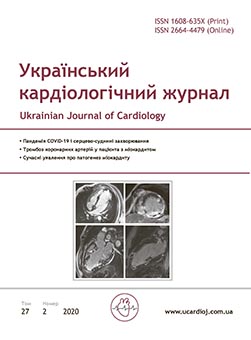Relationship of individual components of antiphospholipid syndrome with different types of left ventricular remodeling in patients with post-infarction cardiosclerosis and arterial hypertension
Main Article Content
Abstract
The aim – to establish the features of left ventricular myocardial remodeling in men with postinfarction cardiosclerosis and to evaluate its relationship with the components of the antiphospholipid syndrome.
Materials and methods. 164 patients with stable coronary heart disease and postinfarction cardiosclerosis were examined (100 % male, 53.0±9.14 years). The total antiphospholipid antibodies (aPL) to cardiolipin, phosphatidylserine, phosphatidylinositol, antibodies to β2-glycoprotein 1 (anti-β2-GP1) IgG and IgM classes were determined by ELISA. Echocardiography was performed by conventional methods, the type of left ventricular (LV) geometry was determined according to Ganau.
Results and discussion. Positive levels of aPL and anti-β2-GP1 IgG were detected in 56.7 % of patients, including 33.5 % – double positivity for these antibodies. Positivity for aPL and anti-β2-GP1 IgG was associated with more significant echocardiographic signs of LV systolic and diastolic dysfunction. Among patients with positive levels of aPL and anti-β2-GP1 IgG LV hypertrophy were higher (2.5–3.0 times, p<0.05) than among patients with negative antibody levels. Increased levels of anti-β2-GP1 IgG were found to be an independent predictor of increased LV myocardial mass index (β=0.344, p<0.0001) in men with postinfarction cardiosclerosis.
Conclusions. In men with postinfarction cardiosclerosis who had positive levels of aPL and anti-β2-GP1 IgG, associated with the development of systolic and diastolic dysfunction and with a higher risk of maladaptive LV remodeling.
Article Details
Keywords:
References
Воронков Л.Г. Пацієнт із ХСН в Україні: аналіз усієї популяції пацієнтів, обстежених у рамках першого національного зрізового дослідження UNIVERS // Серцева недостатність.– 2012.– № 1.– С. 8–14.
Денисюк В.І. Хронічна серцева недостатність: стандарти діагностики, лікування та профілактики за критеріями доказової медицини // Укр. терапевт. журн.– 2008.– № 2.– С. 106–113.
Коваленко В.М., Корнацький В.М. Стан здоров’я народу України та медичної допомоги третинного рівня.– К., 2019. – 224 с.
Лашкул Д.А. Поширеність і кореляційно-статистичні взаємозв’язки дисфункції нирок у хворих на хронічну серцеву недостатність ішемічного ґенезу // Запорожский мед. журн.– 2014.– Т. 82, № 1.– С. 26–29.
Люлька Ю.П. Ремоделювання лівого шлуночка у хворих, які перенесли Q-інфаркт міокарда // Медичні перспективи.– 2005.– Т. 10, № 1.– С. 51–54.
Сиволап В.В., Новіков Є.В., Лисенко В.А. та ін. Особливості оцінювання геометрії лівого шлуночка у хворих на артеріальну гіпертензію // Патологія.– 2017.– Т. 14, № 3 (41).– С. 257–262. doi: https://doi.org/10.14739/2310-1237.2017.3.118306.
Шевчук С.В., Сегеда Ю.В., Кувікова І.П. Антифосфоліпідні антитіла як фактори ризику серцево-судинних уражень у пацієнтів із антифосфоліпідними синдромом // Укр. ревмат. журн.– 2012.– Т. 49, № 3.– С. 40–47.
Andreoli L., Chighizola C.B., Banzato A. et al. Estimated frequency of antiphospholipid antibodies in patients with pregnancy morbidity, stroke, myocardial infarction, and deep vein thrombosis: a critical review of the literature // Arthritis Care Res.– 2013.– Vol. 65 (11).– P. 1869–1873. doi: https://doi.org/10.1002/acr.22066.
Bourke L.T., McDonnell T., McCormick J. et al. Antiphospholipid antibodies enhance rat neonatal cardiomyocyte apoptosis in an in vitro hypoxia/reoxygenation injury model via p38 MAPK // Cell. Death Dis.– 2017.– Р. 2549. doi: https://doi.org/10.1038/cddis.2016.235.
Corban M.T., Duarte-Garcia A., McBane R.D. et al. Antiphospholipid syndrome. Role of vascular endothelial cells and implications for risk stratification and targeted therapeutics // Am. Coll. Cardiol.– 2017.– Vol. 69 (18).– P. 2317–2330. doi: https://doi.org/10.1016/j.jacc.2017.02.058.
Kolitz T., Shiber S., Sharabi I. et al. Cardiac Manifestations of antiphospholipid syndrome with focus on its primary form // Front. Immunol.– 2019.– P. 941. doi: https://doi.org/10.3389/fimmu.2019.00941.
Mavrogeni S.I., Markousis-Mavrogenis G., Karapanagio-tou O. et al. Silent myocardial perfusion abnormalities detected by stress cardiovascular magnetic resonance in antiphospholipid syndrome: a case-control study // J. Clin. Med.– 2019.– Vol. 8 (1084).– P. 1–15. doi: https://doi.org/10.3390/jcm8071084.
Miyakis S., Lockshin M.D., Atsumi T. et al. International consensus statement on an update of the classification criteria for definite antiphospholipid syndrome (APS) // J. Thromb. Haemost.– 2006.– Vol. 4 (2).– P. 295–306. doi: https://doi.org/10.1111/j.1538-7836.2006.01753.x.
Roman M.J., Salmon J.E., Sobel R. et al. Prevalence and relation to risk factors of carotid atherosclerosis and left ventricular hypertrophy in systemic lupus erythematosus and antiphospholipid antibody syndrome // Amer. J. Сardiology.– 2001.– Vol. 87 (5).– P. 663–666. doi: https://doi.org/10.1016/S0002-9149(00)01453-3.
Roth G.A., Johnson C., Abajobir A. et al. Global, regional, and national burden of cardiovascular diseases for 10 Causes, 1990 to 2015 // J. Am. Coll. Cardiol.– 2017.– Vol. 70 (1).– P. 1–25. doi: https://doi.org/10.1016/j.jacc.2017.04.052.
Stepien K., Nowak K., Wypasek E. et al. High prevalence of inherited thrombophilia and antiphospholipid syndrome in myocardial infarction with non-obstructive coronary arteries: Comparison with cryptogenic stroke // Int. J. Cardiol.– 2019.– 290.– P. 1–6. doi: https://doi.org/10.1016/j.ijcard.2019.05.037.
Tektonidou M.G., Andreoli L., Limper M. et al. EULAR recommendations for the management of antiphospholipid syndrome in adults // Ann. Rheumatic Diseases.– 2019.– Vol. 78.– P. 1296–1304. doi: https://doi.org/10.1136/annrheumdis-2019-215213.
Tektonidoua M.G., Ioannidisb J.P.A., Moyssakisc I. et al. Right ventricular diastolic dysfunction in patients with anticardiolipin antibodies and antiphospholipid syndrome // Ann. Rheumatic Diseases.– 2001.– Vol. 60 (1).– P. 43–48. doi: https://doi.org/10.1136/ard.60.1.43.
Tufano A., Lembo M., Di Minno M.N. et al. Left ventricular diastolic abnormalities other than valvular heart disease in antiphospholipid syndrome: An echocardiographic study // Int. J. Cardiol.– 2018.– Vol. 271.– P. 366–370. doi: https://doi.org/10.1016/j.ijcard.2018.05.040.

